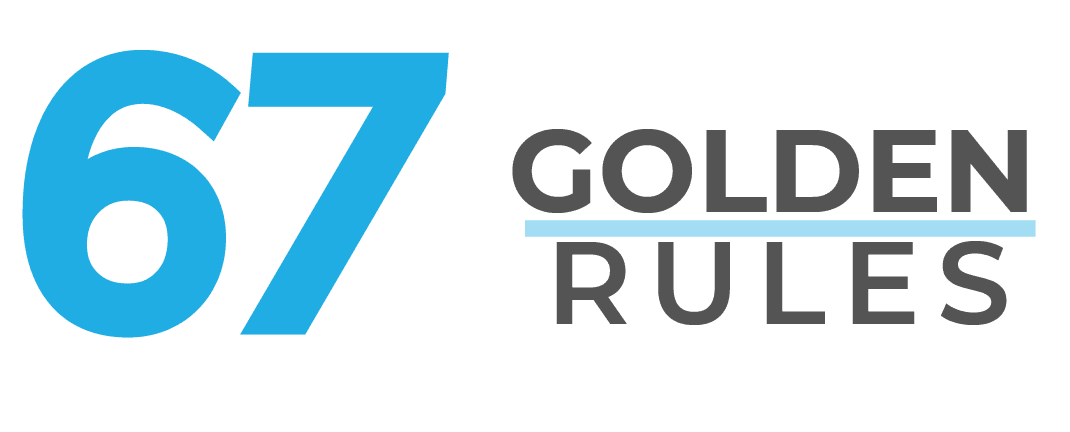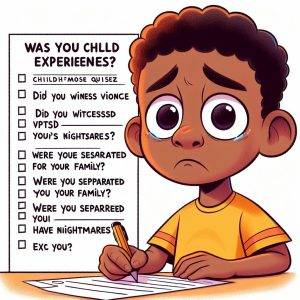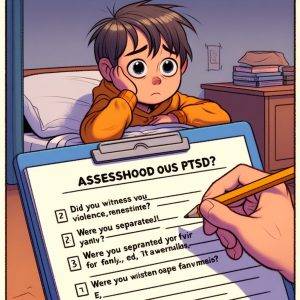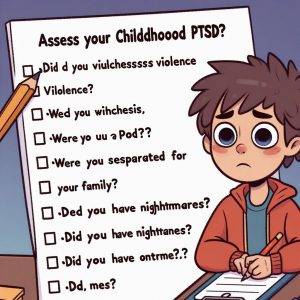Introduction
Childhood PTSD, or Post-Traumatic Stress Disorder, is a serious mental health condition that can have long-lasting effects on your life.
Often stemming from traumatic experiences during formative years, childhood PTSD can manifest in various ways, impacting your emotional well-being and daily functioning.
Identifying this condition early is crucial for effective intervention and support.
In this article, we delve into exploring the Childhood PTSD Quiz, a tool designed to aid in the recognition of potential symptoms and encourage seeking professional help.
What is Childhood PTSD?
Childhood PTSD, also known as developmental trauma disorder or complex PTSD, occurs when children experience prolonged or repetitive trauma, such as physical or emotional abuse, neglect, witnessing domestic violence, or experiencing a significant loss.
The effects of childhood PTSD can manifest in various ways, including behavioral problems, emotional dysregulation, difficulty forming relationships, and academic challenges.
Unfortunately, these symptoms are not always recognized as signs of trauma, which can lead to misdiagnosis or untreated mental health issues later in your life.
So, what is the importance of identifying childhood PTSD?
Importance of Identifying Childhood PTSD
Here are 6 reasons why you should identify childhood PTSD:
- Understanding What’s Up
Alright, imagine you’re feeling all kinds of ways, and you’re not sure why. Recognizing childhood PTSD helps you figure out what’s going on with those feelings and behaviors. It’s like getting a roadmap for your emotions.
- Getting Help ASAP
When childhood PTSD is spotted early, you can dive in with support and treatment right away. That means you can stop things from getting worse down the line and learn how to handle tough stuff like a pro.
- Breaking Free from the Past
Picture this: you catch childhood PTSD early, and it’s like hitting pause on a cycle of bad stuff happening over and over again. By getting help sooner, you can rewrite your story and break free from that cycle.
- Making Feelings Count
Ever felt like what you’re going through doesn’t matter? Identifying childhood PTSD changes that. It tells you that your feelings are real and valid, and that’s a game-changer.
- Smashing Stigma
Let’s talk openly about childhood PTSD. The more we talk, the less stigma there is. That means you feel okay asking for help when you need it, without feeling ashamed or embarrassed.
- Giving Hope for a Better Future
Finding childhood PTSD early means you can build a brighter future. With the right support, you can learn to deal with your feelings and grow into a strong, resilient adult. And that’s pretty awesome, right?
The Childhood PTSD Quiz
To help raise your awareness and assist you in recognizing potential signs of childhood PTSD, here’s a quiz designed to highlight some common symptoms:
- Have you experienced a traumatic event during your childhood, such as physical abuse, sexual abuse, neglect, or witnessing domestic violence?
- Yes
- No
- Do you often experience flashbacks or intrusive memories related to the traumatic event(s) from your childhood?
- Yes
- No
- Do you avoid people, places, or situations that remind you of the traumatic event(s) from your childhood?
- Yes
- No
- Do you struggle with regulating your emotions, experiencing frequent mood swings, anger outbursts, or periods of emotional numbness?
- Yes
- No
- Have you noticed changes in your self-esteem or feelings of worthlessness and shame as a result of the traumatic event(s) from your childhood?
- Yes
- No
- Do you have difficulty forming and maintaining healthy relationships, often feeling distrustful or detached from others?
- Yes
- No
- Have you experienced physical symptoms such as headaches, stomachaches, or insomnia that may be related to your childhood trauma?
- Yes
- No
- Do you find it challenging to concentrate or focus on tasks, particularly in academic or work settings?
- Yes
- No
- Have you engaged in self-destructive behaviors, such as substance abuse, self-harm, or risky sexual behavior, as a way to cope with your childhood trauma?
- Yes
- No
- Have you ever sought professional help or therapy to address issues related to your childhood trauma?
- Yes
- No
Interpreting Your Results
If you answered “Yes” to several of the questions above, it’s possible that you may be experiencing symptoms of childhood PTSD. However, it’s essential to remember that this quiz is not a diagnostic tool, and only a qualified mental health professional can provide a formal diagnosis.
If you suspect that you or someone you know may be struggling with childhood PTSD, it’s crucial to seek support from a therapist or counselor who specializes in trauma-focused therapy.
With the right treatment and support, you can learn to manage your symptoms, heal from past trauma, and build a brighter future.
What Should I Do After Interpreting My Childhood PTSD Quiz Results?
After interpreting the results of the childhood PTSD quiz, here are six steps you can take:
- Seek Professional Help
If you suspect that you may be experiencing symptoms of childhood PTSD, it’s essential to reach out to a qualified mental health professional for further evaluation and support.
They can provide a comprehensive assessment and recommend appropriate treatment options tailored to your needs.
- Explore Therapy Options
Consider engaging in therapy or counseling with a therapist who specializes in trauma-focused approaches, such as Cognitive Behavioral Therapy (CBT), Eye Movement Desensitization and Reprocessing (EMDR), or Trauma-Focused Cognitive Behavioral Therapy (TF-CBT).
Therapy can provide a safe space to process past trauma, develop coping skills, and work toward healing.
- Educate Yourself
Take the time to educate yourself about childhood PTSD and its effects on mental health.
Understanding the symptoms and how they may manifest can empower you to better advocate for yourself and communicate your needs effectively to your healthcare provider.
- Practice Self-Care
Incorporate self-care practices into your daily routine to promote overall well-being and resilience.
This may include activities such as mindfulness meditation, exercise, journaling, spending time in nature, or engaging in hobbies that bring you joy and relaxation.
- Build a Support Network
Reach out to trusted friends, family members, or support groups for emotional support and encouragement.
Building a strong support network can provide a sense of belonging and validation, reducing feelings of isolation and loneliness often associated with childhood trauma.
- Stay Committed to Your Healing Journey
Recovery from childhood PTSD is a process that takes time, patience, and commitment.
Be kind to yourself and acknowledge that healing is not linear. Celebrate your progress, no matter how small, and stay committed to prioritizing your mental health and well-being.
The Bottom Line
The Childhood PTSD Quiz serves as a vital resource in identifying potential symptoms of childhood PTSD and promoting early intervention.
By empowering you to recognize your experiences and seek appropriate support, you can work towards mitigating the long-term impact of childhood trauma on your mental health and well-being.
Let us continue to prioritize mental health awareness and advocacy, ensuring that no one suffers in silence.



